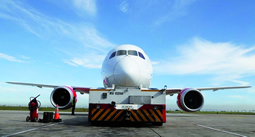 The current Covid-19 disruptions of Kenyan exports to Europe, particularly along triangular supply chains to the UK, highlights the importance of shortening supply chains by wherever possible, contracting with the final retailer and shipping products directly. For exporters who can get to grip with current logistical challenges, rising EU demand for fruit and vegetables and rising prices could yield commercial benefits to counter-balance some of the Covid-19 disruptions. This is particularly the case since labour shortages in the fruit and vegetable sectors as a result of disruptions to labour flows could depress fruit and vegetable production throughout 2020.
The current Covid-19 disruptions of Kenyan exports to Europe, particularly along triangular supply chains to the UK, highlights the importance of shortening supply chains by wherever possible, contracting with the final retailer and shipping products directly. For exporters who can get to grip with current logistical challenges, rising EU demand for fruit and vegetables and rising prices could yield commercial benefits to counter-balance some of the Covid-19 disruptions. This is particularly the case since labour shortages in the fruit and vegetable sectors as a result of disruptions to labour flows could depress fruit and vegetable production throughout 2020.
While in the two weeks to 20th March ‘Kenya’s fresh produce exports to the European Union… dropped 46%’, this was largely a result of the collapse of cut flower sales in Europe, with fresh fruit and vegetable exports holding up reasonably well. According to the CEO of the Agricultural Employers Association (AEA), Wesley Siele, ‘the fresh produce sector was stable’, since ‘supermarkets mainly in the UK, Sweden, and Russia were still ordering fresh produce from the country’. The largest market effects were in the out-of-house dining market component, which saw the rapid cancellation of fresh produce orders. However, according to the EU Agriculture Commissioner Janusz Wojciechowski, ‘the consumption of fresh fruit and vegetables in the EU has been booming in recent weeks. Spain, Italy and the Netherlands report 40% increases, and Germany up to 100%’, with demand ‘expected to stay strong during the containment period.
CEO Siele took the view demand for fresh produce like vegetables and fruits would ‘stabilise in the coming days as the affected countries contain the pandemic’. However, this appears to be an over-optimistic view given the extension of social distancing and lock down measures. In addition, the closure of the EU’s external borders to non-EU nationals for 30 days, alongside similar global movement restrictions, has seen the widespread cancellation of scheduled passenger services, which carry fully 80% of fruit and vegetable sector air freight.
With most of these flights having been grounded, it is reportedly ‘very difficult to find suitable flights’ to the Netherlands, which handles fully 30% of the EU’s extraterritorial imports of fruit and vegetable products. The authorities at Schiphol airport have however moved to reallocate freed up passenger flight slots to cargo flights, although it will take time for new landing rights to be taken up.
 Okisegere Ojepat Chief Executive of the Fresh Produce Consortium of Kenya has highlighted how this is having a very real impact on air freight rates, which tripled in the two weeks to 27th March. As logistical difficulties mount in Kenya and the Covid-19 pandemic begins to spread in Kenya itself, farm workers are being ‘sent home on mandatory leave because orders cannot be shipped’. This is seen as most acute in the green beans and peas sector where Kenya is a major supplier to the EU market.
Okisegere Ojepat Chief Executive of the Fresh Produce Consortium of Kenya has highlighted how this is having a very real impact on air freight rates, which tripled in the two weeks to 27th March. As logistical difficulties mount in Kenya and the Covid-19 pandemic begins to spread in Kenya itself, farm workers are being ‘sent home on mandatory leave because orders cannot be shipped’. This is seen as most acute in the green beans and peas sector where Kenya is a major supplier to the EU market.
Kenya is not the only country affected, with exporters from Ethiopia, Ghana and Madagascar reporting many export markets around the world closing, with only a few niche markets remaining open. There are also reports that ‘cargo flights from Suriname and the Dominican Republic have now been cancelled’, making it increasingly difficult to get air freighted fruit and vegetable exports to markets in the EU. In the case of Surinam, the only cargo space available was on special repatriation flights organized for Dutch citizens wishing to return to the Netherlands.
For Kenya getting goods to Europe is just one dimension of the logistical challenge now being faced. For triangular supply chains, which use distribution hubs in a single EU member states to serve multiple EU markets, logistical challenges are increasingly faced in regard to the onward movement of cargoes, as the free movement of goods across internal EU borders face delays as Covid-19 related movement restrictions and public health requirements are introduced.
These problems of on-ward trade are being compounded by a shortage of drivers, personnel shortages at border posts as staff fall ill or show symptoms of Covid-19, as well as the rising cost of refrigerated containers. Addressing these problems is likely to prove politically complicated given the different response times of EU member states in moving to ‘lock downs’ aimed at containing the pandemic and the different approaches taken to testing.
While efforts are underway to ensure a coordinated approach to facilitating the cross-border movement of essential goods, so far EC efforts to establish ‘green lanes’ to fast track cross border freight movements have only been taken up by 3 EU member states. Against this background these problems of cross border cargo movements are only likely to intensify.
It is against this background that fruit and vegetable exporters in Latin American countries are exploring the scope for organizing air charters to deliver cargoes more directly to target markets. This is seen as particularly important given the rising prices of fresh fruit and vegetables which is underway as demand surges. Current price rises could continue, given the disruption to migrant labour supplies to the agricultural sector which the Covid-19 pandemic has given rise to.
 However, these price increases will not be universal. The recessionary effects of the containment measures introduced in response to the Covid-19 pandemic, are likely to see demand fall for certain products where ACP countries have a growing export interest, such as mangoes and avocadoes. These broader economic effects of the Covid-19 pandemic will need to be considered, as ACP fruit and vegetable exporters seek to adjust to the current Covid-19 market disruptions and post Covid-19 trade and market developments.
However, these price increases will not be universal. The recessionary effects of the containment measures introduced in response to the Covid-19 pandemic, are likely to see demand fall for certain products where ACP countries have a growing export interest, such as mangoes and avocadoes. These broader economic effects of the Covid-19 pandemic will need to be considered, as ACP fruit and vegetable exporters seek to adjust to the current Covid-19 market disruptions and post Covid-19 trade and market developments.
There can be little doubt there are turbulent times ahead for ACP fruit and vegetable exporters, with ACP exporters needing to be nimble in responding to the challenges faced.
